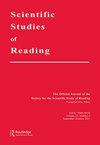问题时间、语言理解和推理中的执行功能
IF 2.4
2区 教育学
Q1 EDUCATION & EDUCATIONAL RESEARCH
引用次数: 4
摘要
摘要本研究在考虑语言理解和执行功能的个体差异的情况下,考察了推理提问时间对幼儿园儿童非阅读情境下推理表现的影响程度。学生完成了为期八周的早期语言理解个性化指导(ELCII)应用程序,通过回答在两种时间条件中的一种进行的视听推理问题:(1)在不同时间点观看视频(在线)或(2)在视频完成后(离线)。结果表明,从测试前到测试后,在线提问促进了推理技能的更大整体收益。此外,执行功能高的学生比执行功能低的学生在推理方面表现出更大的收益。同样,语言理解能力高的学生在推理方面比语言理解能力低的学生表现出更大的进步。讨论了研究结果的理论和教学意义以及未来研究的领域。本文章由计算机程序翻译,如有差异,请以英文原文为准。
Question Timing, Language Comprehension, and Executive Function in Inferencing
ABSTRACT We examined the extent to which the timing of inferential questioning influenced kindergartners’ inferencing performance in a non-reading context, while also taking into account individual differences in language comprehension and executive function. Students completed the eight-week Early Language Comprehension Individualized Instruction (ELCII) application by responding to audiovisual inferential questions administered in one of two timing conditions: either (1) during video watching at various points (online) or (2) after the video was finished (offline). Results suggest that online questioning fostered greater overall gains in inferencing skill from pretest to posttest. Moreover, students with higher executive function demonstrated greater gain in inferencing than students with lower executive function. Likewise, students with higher language comprehension skills demonstrated greater gains in inferencing than students with lower language comprehension skills. Theoretical and instructional implications of the findings and areas for future research are discussed.
求助全文
通过发布文献求助,成功后即可免费获取论文全文。
去求助
来源期刊

Scientific Studies of Reading
Multiple-
CiteScore
7.20
自引率
2.70%
发文量
26
期刊介绍:
This journal publishes original empirical investigations dealing with all aspects of reading and its related areas, and, occasionally, scholarly reviews of the literature, papers focused on theory development, and discussions of social policy issues. Papers range from very basic studies to those whose main thrust is toward educational practice. The journal also includes work on "all aspects of reading and its related areas," a phrase that is sufficiently general to encompass issues related to word recognition, comprehension, writing, intervention, and assessment involving very young children and/or adults.
 求助内容:
求助内容: 应助结果提醒方式:
应助结果提醒方式:


